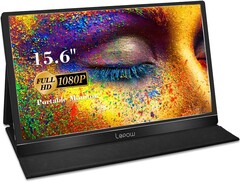
Although it’s marketed as being portable, the Lepow Z1 can still make for a good monitor on almost any desk setup because of its flexibility and small footprint.
Amazon is now offering the Lepow Z1 portable monitor for $10 USD off the original launch price of $200. The manufacturer has sent us a test unit for our honest impressions.
Manufacturer specifications:
- 15.6-inch IPS, 1920 x 1080, 60 Hz
- 72% NTSC color gamut
- Mini-HDMI, 1x USB-C (Power only), 1x USB-C (DP + PD), 3.5 mm audio
- 368 x 225 x 8.8 mm
- 770 g
Build quality is pretty good due to the metal backing and trims while the included folio case helps to further protect the monitor. You’ll still have to be careful with the matte screen, however, as it is easy to damage or scratch since there is no glass protection.
Connecting the Z1 to a laptop can be confusing at first. Although there are two USB-C ports, only the port on the left edge is compatible with video while the port on the right is for power only. The manufacturer should make both USB-C ports compatible with video for more flexibility. Additionally, the Z1 integrates mini-HDMI which is much less common than full-size HDMI.
| 100.6 cd/m² |
98.1 cd/m² |
100.3 cd/m² |
||
| 95.4 cd/m² |
96.4 cd/m² |
94.7 cd/m² |
||
| 101.3 cd/m² |
102.1 cd/m² |
96.1 cd/m² |
||
Distribution of brightness
X-Rite i1Pro 2
Maximum: 102.1 cd/m² (Nits) Average: 98.3 cd/m² Minimum: 29.9 cd/m²
Brightness Distribution: 93 %
Contrast: 964:1 (Black: 0.1 cd/m²)
ΔE Color 5.2 | 0.59-29.43 Ø5.2, calibrated: 3.92
ΔE Greyscale 5.2 | 0.57-98 Ø5.4
42.4% AdobeRGB 1998 (Argyll 2.2.0 3D)
61.8% sRGB (Argyll 2.2.0 3D)
41.1% Display P3 (Argyll 2.2.0 3D)
Gamma: 2.46
Image quality is a mixed bag when connected to our Razer Blade 18 as the host PC. Firstly, brightness is very low at just around 100 nits even when set to the maximum brightness setting. Using the provided AC adapter power source would not improve the brightness results. Furthermore, color coverage is narrow at just 62 percent of sRGB.
The model does not come pre-calibrated out of the box which is to be expected because of its affordable price. Color temperature in particular is far too cool. Owners can try applying our calibrated ICM profile above to get more accurate colors from the Z1.
Black-white and gray-gray response times are relatively slow as well. A pulse-width modulation of 1006 Hz is present on brightness level 7 or dimmer.
The built-in speakers are unsurprisingly weak and with almost no bass. They’re good enough for quieter indoor office spaces, but they’re nowhere near powerful enough for outdoor use.
Based on our measurements and time with the Z1, the monitor is at its best as a secondary screen for coding, emailing, spreadsheets, web browsing, and other activities where fast response times and accurate colors are not priority. The occasional video or undemanding game also don’t hurt, but the low brightness of the screen makes it difficult to view such content especially if ambient lighting can’t be controlled.
For a brighter display with more accurate colors, the Innocn OLED may be a worthwhile alternative. It is, of course, noticeably more expensive.
| Lepow Z1 1920×1080, 15.60 |
GMK KD2 Portable Monitor 3840×2160, 15.60 |
Vissles Monitor 15.6 1920×1080, 15.60 |
Ananta 17.3-inch Touchscreen Portable Monitor RTK3B3A, , 1920×1080, 17.30 |
AirTab Portable Monitor 15.6-inch 1920×1080, 15.60 |
|
|---|---|---|---|---|---|
| Display |
108% |
12% |
79% |
-1% |
|
| Display P3 Coverage |
41.1 |
92.3 125% |
47.33 15% |
78.8 92% |
40.72 -1% |
| sRGB Coverage |
61.8 |
100 62% |
66.4 7% |
100 62% |
61 -1% |
| AdobeRGB 1998 Coverage |
42.4 |
100 136% |
48.6 15% |
77.6 83% |
42.11 -1% |
| Response Times |
26% |
-7% |
784% |
4% |
|
| Response Time Grey 50% / Grey 80% * |
40.1 ?(18.8, 21.3) |
55.6 ?(30, 25.6) -39% |
41.2 ?(22.8, 18.4) -3% |
38.4 ?(20, 18.4) 4% |
36 ?(18, 18) 10% |
| Response Time Black / White * |
30.4 ?(17.5, 12.9) |
38.8 ?(22.4, 16.4) -28% |
35.2 ?(22.4, 12.8) -16% |
26.8 ?(18, 8.8) 12% |
31.2 ?(19.6, 11.6) -3% |
| PWM Frequency |
1006 |
2451 ?(30) 144% |
1000 ?(99) -1% |
24510 ?(20) 2336% |
1042 ?(20) 4% |
| Screen |
55% |
0% |
21% |
-1% |
|
| Brightness middle |
96.4 |
415.1 331% |
248.1 157% |
244.6 154% |
206.5 114% |
| Brightness |
98 |
412 320% |
237 142% |
231 136% |
198 102% |
| Brightness Distribution |
93 |
91 -2% |
91 -2% |
88 -5% |
88 -5% |
| Black Level * |
0.1 |
0.36 -260% |
0.28 -180% |
0.27 -170% |
0.33 -230% |
| Contrast |
964 |
1153 20% |
886 -8% |
906 -6% |
626 -35% |
| Colorchecker dE 2000 * |
5.2 |
5.93 -14% |
6.85 -32% |
3.7 29% |
4.25 18% |
| Colorchecker dE 2000 max. * |
17.31 |
8.64 50% |
20.8 -20% |
9.36 46% |
18.11 -5% |
| Colorchecker dE 2000 calibrated * |
3.92 |
1.48 62% |
5.69 -45% |
3.08 21% |
4.08 -4% |
| Greyscale dE 2000 * |
5.2 |
5.6 -8% |
5.8 -12% |
6.1 -17% |
3.1 40% |
| Gamma |
2.46 89% |
2.18 101% |
2.34 94% |
2.24 98% |
2.31 95% |
| CCT |
7317 89% |
5820 112% |
6402 102% |
8089 80% |
6994 93% |
| Color Space (Percent of AdobeRGB 1998) |
42.8 |
69.8 |
38.7 |
||
| Color Space (Percent of sRGB) |
65.8 |
100 |
60.8 |
||
| Total Average (Program / Settings) |
63% / |
2% / |
295% / |
1% / |
* … smaller is better
Disclaimer: Notebookcheck is not responsible for price changes carried out by retailers. The discounted price or deal mentioned in this item was available at the time of writing and may be subject to time restrictions and/or limited unit availability.
Related Articles
Allen Ngo – Lead Editor U.S. – 5039 articles published on Notebookcheck since 2011
After graduating with a B.S. in environmental hydrodynamics from the University of California, I studied reactor physics to become licensed by the U.S. NRC to operate nuclear reactors. There’s a striking level of appreciation you gain for everyday consumer electronics after working with modern nuclear reactivity systems astonishingly powered by computers from the 80s. When I’m not managing day-to-day activities and US review articles on Notebookcheck, you can catch me following the eSports scene and the latest gaming news.
Allen Ngo, 2023-03-12 (Update: 2023-03-12)







